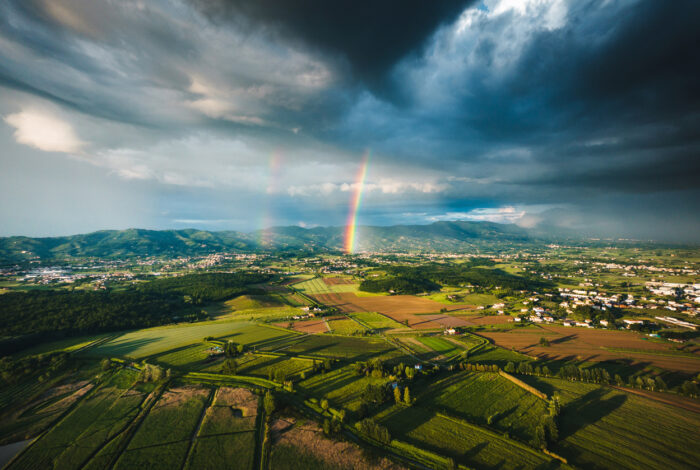Growing up, July was a time of ease. Days were long and warm. There was no school. I have fond memories of beach trips, mountain trips, pool time, summer camps, and watermelon. Nowadays, as the effects of the climate crisis have become more pronounced, summer has begun to feel more ominous.
The Jewish calendar understands the three weeks between the 17th of Tammuz and 9th of Av as a time of intense mourning, when we remember the destruction of the Temple in Jerusalem. Because of my childhood experiences, I used to have trouble associating destruction with summer. Not this summer.
During a late June heatwave, I used our local river – the Eno River – as a mikveh. On the Fourth of July, my family and I enjoyed a pool day with splash contests, coin-diving, and a greased watermelon competition. Two days later, our region, like Texas, was inundated in a historic flood. Flooding has happened throughout human history. However, with the onset of climate change, the intensity and frequency of flooding has dramatically increased, including just this week in the New York area.
The flooding killed several people including a member of our synagogue. It severely damaged homes, roads, and properties. Our local pool was eight feet underwater. The Eno River has been contaminated from leaked sewage and other pollutants. Riverside trails are closed indefinitely as officials evaluate the damage. I don’t know the next time I will be able to immerse in the Eno River safely.
It has felt like the three weeks started early.
On this first Shabbat of the three weeks, we will read a special haftarah: Jeremiah 1:1-2:3. Jeremiah was sent by God to warn Judah and Jerusalem of their impending destruction. He had the unenviable task of proclaiming to the people that their lives were about to rupture in ways they could not imagine.
In Jeremiah 1:10, God tells Jeremiah,
See, I appoint you on this day
Over nations and kingdoms:
To uproot and to pull down,
To destroy and to overthrow,
To build and to plant.
I used to read Jeremiah as a failed prophet. He was sent to warn Judah and Jerusalem of their impending destruction. Despite his warnings, they did not repent. Jerusalem was destroyed and its leaders taken into exile.
These days, I read Jeremiah differently. It may be that the destruction Jeremiah was tasked with proclaiming was unavoidable. Jeremiah was appointed to tell the truth of the devastation that would befall Jerusalem and to encourage people to find a way to live beyond it. It was never within Jeremiah’s power to avert disaster.
From this perspective, Jeremiah was a wildly successful prophet. He correctly proclaimed doom and hope. He did not deny the truth of the traumatic events facing Jerusalem. But as they unfolded, he was also able to give people hope amid the destruction of everything that they had ever known.
If you transpose the book of Jeremiah onto our times, Jeremiah could be prophesying about the climate crisis. We have all heard the warnings from climate scientists, and yet we have so far been unable to avoid barreling towards irreparable harm to our planet. Jeremiah’s language of “uproot” and “pull down” doesn’t even feel like a metaphor when surveying destruction from flooding.
However, Jeremiah doesn’t just proclaim uprooting, pulling down, destroying, and overthrowing. Jeremiah also encourages Judeans to build and plant. He encourages resilience in the face of unspeakable tragedy. He encourages hope amidst despair.
Before destruction comes, it is hard to imagine or prepare for it. But after destruction comes, it can be hard to find hope.
The season of the three weeks is an invitation to find a dynamic balance between hope and despair. Not only can we imagine destruction on a scale we have never seen, we can also imagine what it might look like to build, plant, and thrive after the unimaginable has occurred.

